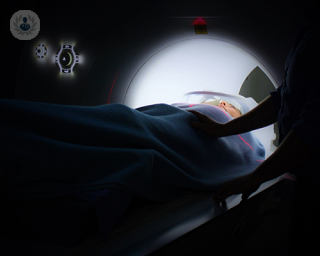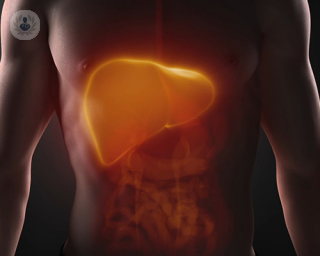Liver cancer
Mr Satyajit Bhattacharya - Surgery
Created on: 05-07-2013
Updated on: 12-05-2023
Edited by: Karolyn Judge
What is liver cancer?
Liver cancer can be of two kinds. Primary liver cancer is a form of cancer that starts in the liver, as opposed to secondary liver cancer which starts elsewhere in the body and travels to the liver. Most cancer that is found in the liver is secondary cancer, as cancer cells travelling around the body often end up in the liver.

What are the symptoms of liver cancer?
The usual symptoms of liver cancer include:
- Weight loss;
- Swelling of the abdomen;
- Jaundice;
- Pale-coloured or grey stool;
- Dark urine;
- Itchy skin;
- High temperature;
- Worsening of health in patients with cirrhosis or chronic hepatitis.
What causes liver cancer?
It isn't always clear what causes liver cancer but there are certain risk factors that can increase the chance of getting it:
- Having an immediate relative, such as a parent or sibling, that has had primary liver cancer;
- You're a man;
- Having certain medical conditions such as hepatitis, cirrhosis, gallstones, diabetes, HIV and a parasite in the liver (liver flukes);
- You're over the age of 60 - liver cancer is most common in older people.
Lifestyle is also linked to risk factors that can lead to liver cancer. Being overweight, exposed to harmful chemicals, excessive alcohol consumption and smoking can all cause primary liver cancer, and it's advised to make changes and take precaution if you are around any of these things.
How is liver cancer diagnosed?
Liver cancer specialists can conduct various tests and scans to check for liver cancer. These include:
- Blood tests;
- Ultrasound, CT or MRI scans;
- PET scan - if there's a possibility you could have secondary liver cancer, you may need this test;
- Liver biopsy.
The results from the test, or tests you have, for liver cancer, will then be explained at a later date. Your specialist will let you know what happens next.
What are the types of primary liver cancer?
There are a number of different types of cancer that start in the liver. These include:
-
Primary and secondary liver cancer
As previously highlighted, the liver is vulnerable to primary liver cancer, which means the cancer begins in the liver, or secondary liver cancer, meaning the cancer cells travelled to the liver through the blood stream from another cancerous part of the body. Cancer is treated according the primary type it is, so even if the cancer is present in the liver, in cases of secondary cancer it will be treated in the same way the primary cancer is treated. Most cancers found in the liver are secondary cancer. -
Hepatocellular carcinoma (HCC)
Otherwise known as hepatoma, HCC is the most common form of primary liver cancer. The cancer forms in the liver cells, called hepatocytes, and is more common in those who have suffered with cirrhosis. -
Fibrolamellar carcinoma
This form of liver cancer is a rare form of HCC in younger people, and is not linked to cirrhosis or hepatitis. -
Cholangiocarcinoma (bile duct cancer)
Cholangiocarcinoma develops in the bile ducts, which carry bile from the liver to the stomach. -
Angiosarcoma
This is a very rare form of liver cancer, and begins in the blood vessels of the liver. It affects men and women, most often in their 70s and 80s. -
Hepatoblastoma
This is another very rare form of liver cancer, which usually affects young children below the age of three. There are usually only around 20 cases of hepatoblastoma per year in the UK.
What are the stages of liver cancer?
The stage indicates the size of a tumour, whether it has spread and to where. There are different staging systems for liver cancer that doctors can use:
- TNM staging
TNM stands for tumour, node, metastasis. T represents the size of the primary tumour, N is whether the cancer has spread to the lymph nodes and M is whether the cancer has spread to another part of the body.
- BCLC staging system and Child-Pugh system
The BCLC, or Barcelona Clinic Liver Cancer staging system looks at the number and size of liver tumours, your general health and fitness which is called your performance status (PS), and your liver function.
Liver function is often gauged by using the Child-Pugh system, which looks at the levels of bilirubin and albumin (a liver protein) in the blood, how quickly the blood clots, if there's fluid in the abdomen and if the cancer is affecting brain function. Patients are given a score, which then means they fall into one of 3 classes; A, B and C. A means the liver is working normally, B means mild to moderate damage and C means there is severe liver damage. A Child-Pugh score of C could mean that you may be too sick for cancer treatment.
What is secondary liver cancer? Is it the same as liver cancer metastasis?
Secondary liver cancer is when a cancer that started elsewhere in the body, such as the lung, has spread to the liver. If some cancer cells break away from the primary cancer, they can move to another part of the body via the bloodstream or lymphatic system.
Secondary cancer is made up of the same kind of cells as the primary cancer. Secondary liver cancer is also called liver metastasis. Any secondary cancer can spread to the liver, and the most common ones to metastasise are:
- Breast cancer
- Bowel cancer
- Lung cancer
- Pancreatic cancer
- Stomach cancer
- Ovarian cancer
- Neuroendocrine tumour cancers (NET)
How is liver cancer treated?
There are a number of different treatment options available for liver cancer, depending on the type of liver cancer it is.
The most common type of liver cancer treatment is surgery, with removal of the tumour attempted at first. Liver function may be able to continue as normal if the liver was healthy to begin with.
Liver transplant may also be required if the cancer has developed in a large amount of the liver.
The specialist may decide to use localised treatments such as chemotherapy or immunotherapy, or localised treatments such as radiofrequency ablation, cryoablation, radiation therapy or hepatic arterial drug therapy.
What is the survival rate of liver cancer?
Survival rates for liver cancer are more difficult to estimate in comparison to other cancers. It depends on several factors, which include:
- How advanced your cancer is at diagnosis;
- The individual, particularly his/her level of fitness
- Type of liver cancer
- Treatment used
At stage 0 on the BCLC staging system, the median survival for liver cancer is more than 3 years. With treatment, however, between 70 and 90 per cent of people will survive liver cancer for 5 years or more. To find about the different stages in this system, visit the Cancer Research UK website.
Which specialist treats liver cancer?
Surgeons who operate on the liver, hepatologists who are physicians specialising in liver disease, and oncologists, who are specialists in cancer treatments, treat liver cancer. To make an appointment with a specialist regarding liver cancer, click here.
















